Key Takeaways
- You can vacuum seal hard-boiled eggs.
- This is a convenient way to store eggs if you need to keep them fresh for a long period of time.
- Vacuum sealing also prevents the eggs from absorbing any odors from their surroundings.
If you’re like most people, you probably think of vacuum sealing as a way to preserve dry goods and extend the shelf life of non-perishable items. But did you know that vacuum sealing can also be used for cooked foods? That’s right – with the right equipment, you can vacuum seal hard-boiled eggs!
But why would you want to do this? Well, there are several benefits. Vacuum-sealed eggs will last longer in the fridge than un-sealed eggs, so if you’re meal-prepping or looking to make ahead, they’re a great option.
They also freeze well, so if you have a surplus of hard-boiled eggs, vacuuming them is a great way to store them for later use.
Finally, vacuum-sealed eggs are less likely to develop bacteria or other contaminants – making them safer to eat (and less smelly!)
So how do you go about it? First, make sure your eggs are completely cooled before attempting to seal them. If they’re even slightly warm, condensation can build up inside the egg and cause it to spoil more quickly.
Once they’re cool, gently place each egg into its own individual baggie and seal it shut.
Then use your vacuum sealer according to the manufacturer’s instructions – typically this means placing the bagged egg into the chamber and closing the lid until it locks into place.
Can you vacuum seal hard-boiled eggs and how long will they last?
You can vacuum seal hard-boiled eggs and they will last longer than if they were not sealed.
Hard-boiled eggs in the shell can be refrigerated for up to one week when vacuum sealed, while peeled hard-boiled eggs can be stored in the fridge for up to two days or in the freezer for up to a year.
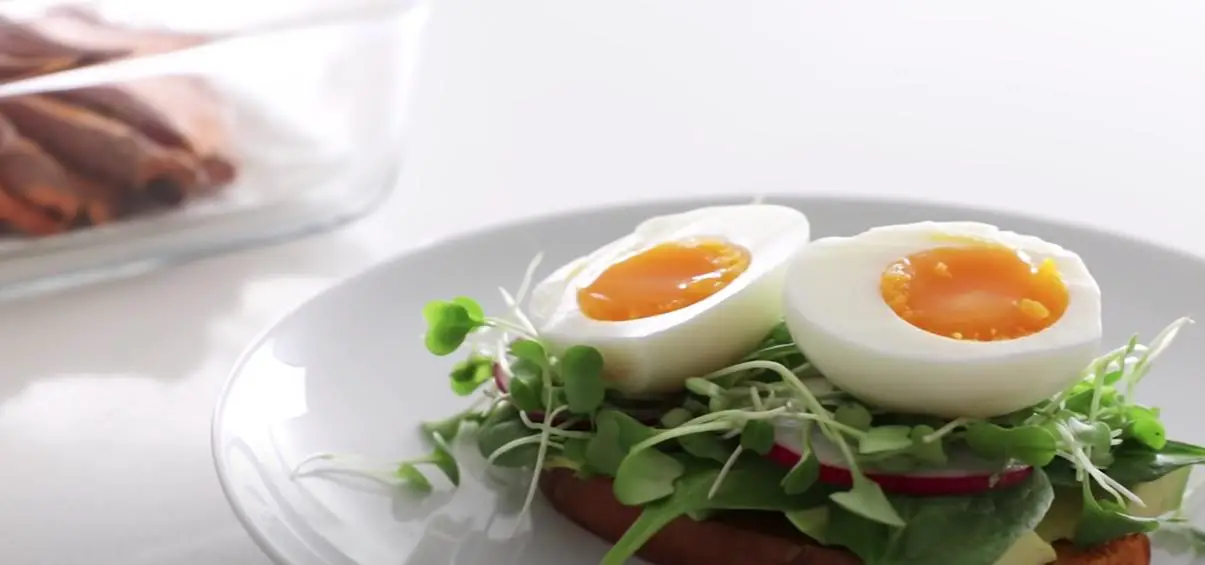
This is a great way to extend the shelf life of your hard-boiled eggs, and it’s also handy if you need to transport them somewhere.
Just make sure that you use a good quality vacuum sealer so that your eggs are well-sealed.
What is the best way to store hard-boiled eggs?
Hard-boiled eggs are a versatile and convenient food – they can be eaten as is, used in salads, or as part of another dish. But how best to store them so that they stay fresh and delicious?
The answer may surprise you – vacuum sealing them is the best way to go! Vacuum sealing will keep hard-boiled eggs fresher for longer, and prevent them from absorbing flavors from other foods.
Plus, it’s easy to do – just transfer the eggs to an airtight container or resealable bag after cooking, and then vacuum seal it.
If you’re not planning on eating the eggs right away, storing them in the fridge with their shells on is also a good idea. This will help keep them fresh for longer.
But whatever you do, don’t forget to transfer them to a bowl of cold water immediately after cooking – this will help prevent them from overcooking.
How do restaurants keep hard-boiled eggs fresh?
If you’re looking for a way to keep your hard-boiled eggs fresh, vacuum sealing is the way to go.
Vacuum sealing works by removing all the air from around the food, which prevents spoilage and extends its shelf life.
When it comes to hard-boiled eggs, you’ll want to store them in their shells in the refrigerator. This will help prolong their freshness.
Peeling hard-boiled eggs can be tricky, but if you slip your fingers underneath the shell and remove it in larger pieces, it should come off more easily.
How long can you keep vacuum-sealed cooked eggs?
You can keep vacuum-sealed cooked eggs for 2-3 months in the freezer, and 2 weeks in the fridge. This is a great way to extend the shelf life of your cooked eggs.
Is it better to freeze or refrigerate vacuum-sealed hard-boiled eggs?
Many people are unsure whether it is better to freeze or refrigerate vacuum-sealed hard-boiled eggs. The answer may surprise you – it is actually better to freeze them!
This is because they will last for several months in the freezer, whereas refrigerated eggs will only last for a few days.
There are many benefits to freezing vacuum-sealed hard-boiled eggs.
Firstly, they will last much longer than if they were stored in the fridge. This means that you can store them for future use, and not have to worry about them going bad too quickly.
Secondly, frozen eggs are easier to peel than fresh ones. This is because the ice helps to loosen the eggshell from the egg white, making peeling a breeze.
How do I extend the shelf life of perishable items using a vacuum sealer?
Perishable items like food can last up to three to five times longer when vacuum sealed. This is because the process of vacuum sealing removes all the air from around the food, which in turn prevents spoilage and freezer burn.
Not only does this method preserve the quality of your food, but it also saves you money in the long run by reducing waste.
What are some foods that can be frozen using a vacuum sealer?
When it comes to storing food, there are a lot of options out there. You can freeze foods using traditional methods, like wrapping them in plastic wrap or placing them in freezer bags.
Or, you can use a vacuum sealer to freeze foods. Vacuum sealing is a great way to store food because it keeps air out and prevents freezer burn. Plus, it’s really easy to do!
So, what are some foods that can be frozen using a vacuum sealer? Vegetables, fruits, and meatballs are all great options.
Just place the food in a bag and seal it up with the vacuum sealer. Then put the bag in the freezer and let the food freeze solid. Once frozen, you can store the food in the bag for as long as you need.
Vacuum sealing is an excellent way to keep food fresh and prevent waste. So next time you’re stocking up your freezer, consider using a vacuum sealer instead of traditional methods.
Can I vacuum seal the quiche for freezing?
Vacuum-sealing quiche is a great way to extend its shelf life and keep it tasting fresh. When vacuum sealed, quiche can last for up to 2 months in the freezer.
This method of storage also prevents freezer burn, so your quiche will be just as delicious when you thaw it out as it was when you first made it.
To vacuum seal quiche, simply place it in a zip-top freezer bag and then use your vacuum sealer to remove all the air from the bag.
Once sealed, store the quiche in the freezer until you’re ready to enjoy it. When you’re ready to eat, simply thaw overnight in the refrigerator or microwave straight from frozen.
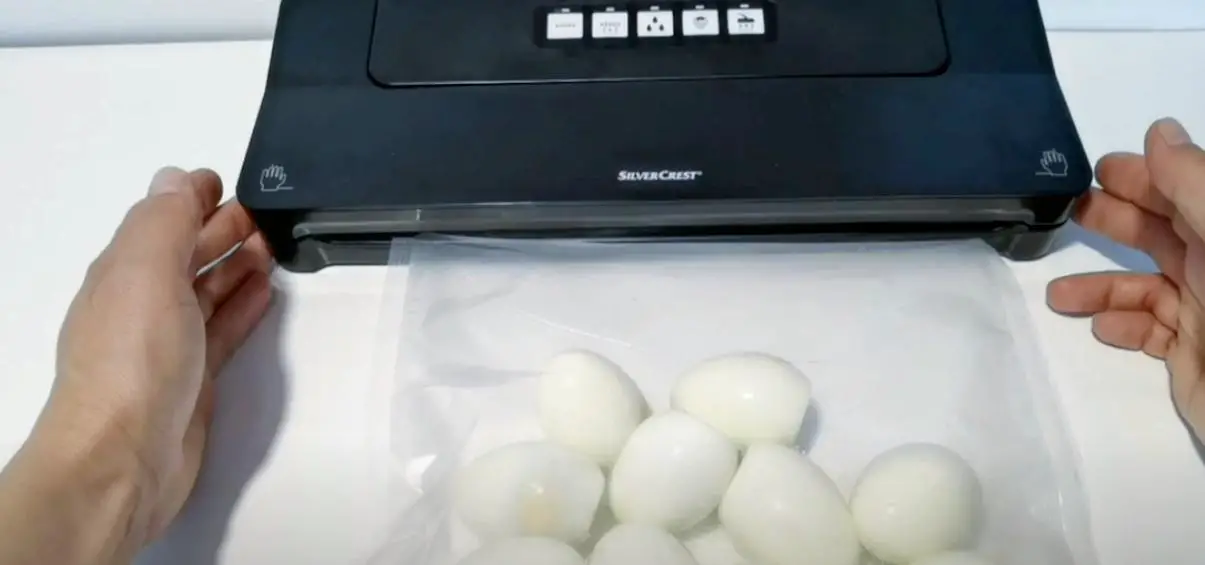
What are the benefits of vacuuming sealing lettuce compared to other storage methods?
Vacuum-sealing lettuce is an effective way to extend its shelf life and keep it fresh for longer.
This storage method can help preserve food for up to two weeks, which is much longer than other methods such as refrigeration.
Vacuum sealing is also a safe way to store food since it prevents the growth of bacteria and mold.
Final Verdict
You can vacuum seal hard-boiled eggs to extend their shelf life. This simple process will keep them fresh in the fridge for up to a week or in the freezer for several months.
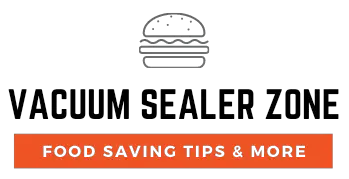
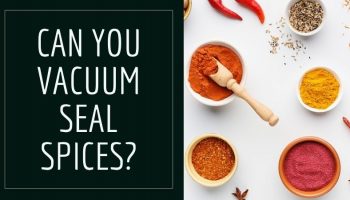
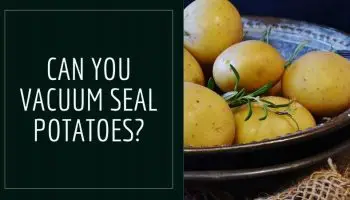
![Can You Vacuum Seal Tomatoes? [The Proper Way!]](https://vacuumsealerzone.com/wp-content/uploads/2021/08/Can-You-Vacuum-Seal-Tomatoes-350x200.jpg)